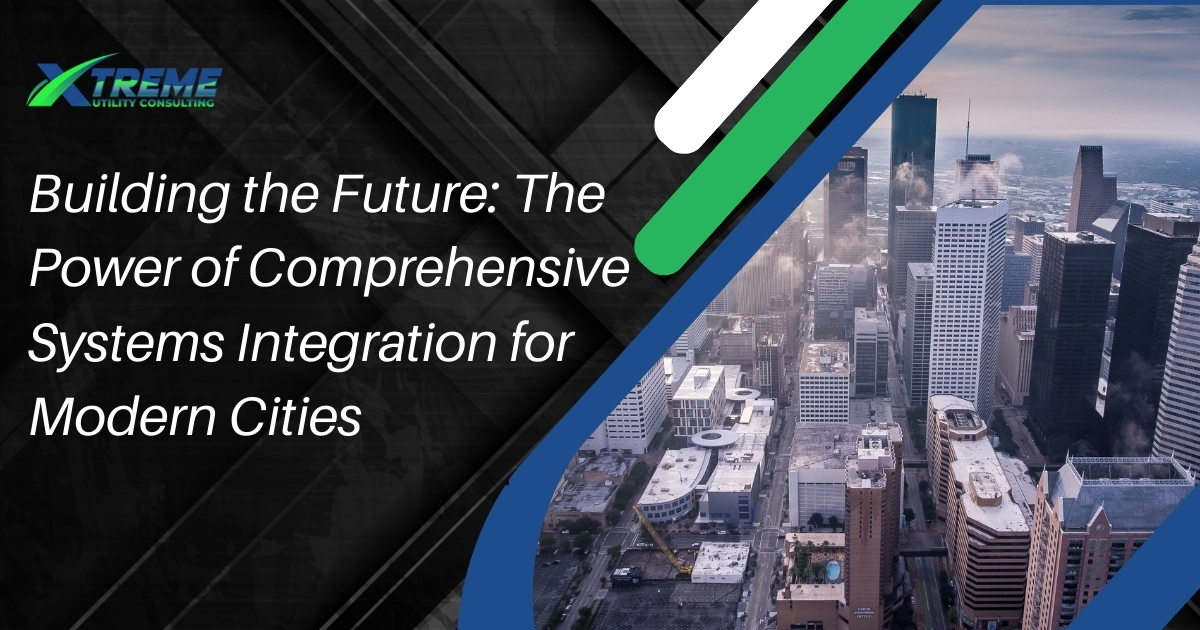Building the Future: The Power of Comprehensive Systems Integration for Modern Cities
In today’s rapidly advancing urban environments, cities and counties are grappling with the challenge of managing an array of complex, independent systems—ranging from electricity grids and water management to transportation networks and waste management services. Without a cohesive strategy to unite these services, inefficiencies, increased costs, and reliance on outdated infrastructure become inevitable. That’s where the importance of systems integration solutions comes into play.
At Xtreme Utility Consulting, we specialize in helping cities and counties develop and implement a comprehensive roadmap to effectively integrate their essential utilities. By harmoniously uniting various technologies and systems, we pave the way for modern cities to operate seamlessly, reduce operational costs, and overcome the limitations of legacy infrastructure. In this blog, we’ll dive into the importance of systems integration solutions and how our expertise in creating robust infrastructures can transform urban management.
Why Systems Integration is Critical
Modern cities depend on numerous utilities and infrastructure systems to ensure smooth operations. These systems—such as electricity, water, waste management, and transportation—are typically managed by separate entities, often using outdated technologies that don’t communicate with each other. The lack of integration creates inefficiencies, increases costs, and leaves cities vulnerable to operational breakdowns.
A comprehensive systems integration strategy ensures that these disparate technologies are connected into a unified network, where data flows seamlessly across all systems. This allows city planners and administrators to have real-time visibility into the status of their infrastructure, leading to better decision-making, quicker responses to problems, and greater operational efficiency.
Key Areas of Systems Integration
1. Electricity Management
Efficient power distribution is the backbone of any city, powering homes, businesses, and essential services. However, aging infrastructure often leads to blackouts and unnecessary energy loss. By integrating smart grids and renewable energy sources into the city’s power management system, our solutions provide a real-time understanding of energy usage. This allows for optimized power distribution, reducing costs and minimizing energy waste.
2. Water Management
Water is one of the most precious resources, and its efficient management is critical to the health of any city. Through smart meters and data-driven technologies, cities can track water consumption patterns, detect leaks early, and implement water-saving strategies. By integrating water management systems into the broader city infrastructure, municipalities can ensure that every drop is used efficiently.
3. Transportation Systems
Transportation networks are the lifeblood of cities, enabling the movement of people and goods. However, outdated traffic management systems, coupled with increasing population pressures, can lead to congested roads, pollution, and increased fuel consumption. Our comprehensive systems integration solution helps to unite traffic control systems, public transport, and even electric vehicle charging stations into a cohesive network. This results in reduced congestion, smoother traffic flow, and decreased emissions, contributing to a greener and more efficient city.
4. Waste Management
The proper disposal and recycling of waste are critical to maintaining a clean and sustainable environment. However, manual processes and disconnected waste management systems can lead to inefficiencies and increased costs. By integrating smart sensors and data analytics, cities can optimize waste collection routes, monitor the filling levels of containers, and ensure that waste is processed in the most efficient manner possible.
Overcoming Legacy Infrastructure Challenges
One of the biggest obstacles cities face when adopting systems integration solutions is dealing with outdated or legacy infrastructure. These older systems were not designed to communicate with one another, making integration more complex. Xtreme Utility Consulting specializes in overcoming these challenges by providing innovative solutions that connect older systems with newer technologies. This ensures that cities can leverage their existing infrastructure while still benefitting from modern advancements in data sharing, automation, and system-wide connectivity.
The Benefits of a Unified System
By implementing a systems integration strategy, cities can unlock a wide range of benefits that include:
- Increased Efficiency: Unified systems reduce redundancy and manual effort, allowing resources to be used more effectively.
- Cost Savings: Optimized resource use, minimized waste, and improved energy efficiency lead to significant cost reductions.
- Real-Time Monitoring: Access to real-time data enables cities to respond proactively to issues before they escalate.
- Sustainability: Integrated systems help reduce the environmental footprint of urban operations through more efficient use of resources.
- Future-Proofing: As technology evolves, integrated systems are more adaptable, ensuring that cities are ready for future advancements.
Conclusion
As urban centers grow and evolve, the need for efficient, cohesive infrastructure becomes even more critical. At Xtreme Utility Consulting, we are committed to providing comprehensive systems integration solutions that empower cities to operate at their best. From energy and water management to transportation and waste disposal, our expertise helps create resilient, future-proof cities that can thrive in a rapidly changing world.
If you’re ready to explore how our systems integration solutions can benefit your city, visit our website or contact us today!
 469-999-0823
469-999-0823
